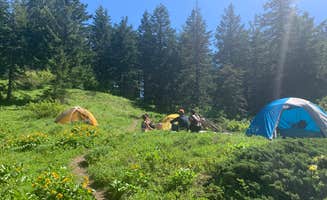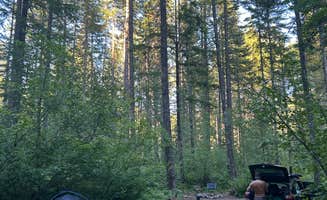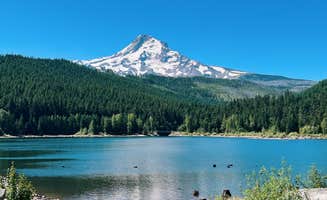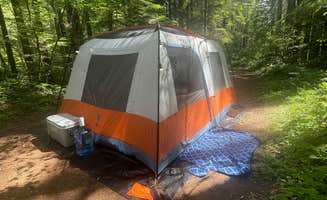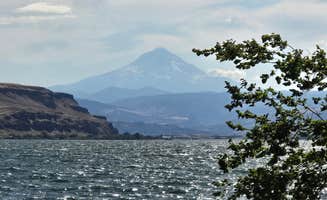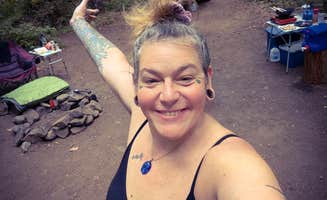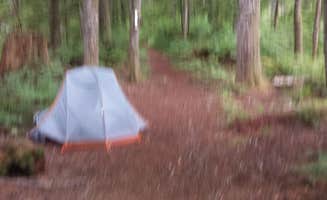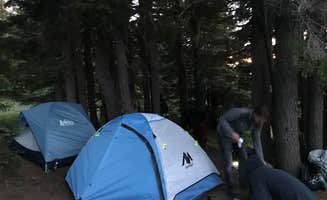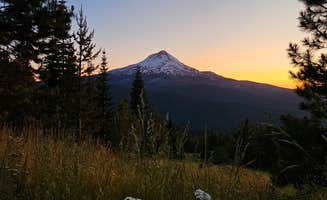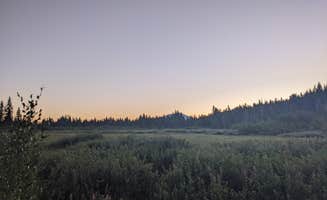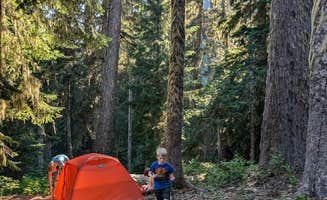Primitive camping near Underwood, Washington extends across the western portion of Gifford Pinchot National Forest, where elevations range from 1,200 to 4,000 feet and summer temperatures typically fluctuate between 50-85°F. This region receives approximately 70 inches of annual rainfall, creating lush forest conditions and numerous small creeks throughout the dispersed camping areas. Most primitive sites require Northwest Forest Pass ($5 daily or $30 annual) displayed on vehicles.
What to do
Waterfall exploring: 1-2 miles round trip. At Panther Creek Creekside Camp, you can explore multiple water features within a short distance. One camper noted: "Not too far from the nearest town but you will feel totally immersed out here. Ice cold creek, towering trees. Seemed to be lots of sites off the road to pick from."
Mountain hiking: 4-8 miles. The area near Big Huckleberry Mountain Dispersed Campground offers hiking trails with elevation gains of 1,500-2,500 feet. A reviewer mentioned: "We met some PCT hikers along the way; some were heading towards the Crest Camp Trailhead... Bring your trowel and TP to stay at these dispersed sites."
Riverside relaxation: 0 miles. Primitive sites along Trapper Creek allow direct water access for cooling off during hot summer days. A camper at Little Soda Springs Rd Dispersed shared: "A couple spots right off the road for car camping or small campers... We opted to walk south along the river to try and find a space. Ended up crossing the river where there are a couple more hidden spots."
What campers like
Isolation without remoteness: 30 minutes from towns. Many campers appreciate the balance of wilderness with reasonable proximity to services. A Little Soda Springs Rd Dispersed camper noted: "Very little traffic. Not far from the highway just in case of emergencies. Absolutely no cell service. You must have a Northwest Forest pass or America the beautiful pass."
Nighttime experiences: clear skies. The distance from urban areas creates exceptional stargazing opportunities at Top 'O the Mountain primitive sites. One camper simply stated: "At the top of a mountain with gorgeous views of Mt. Hood and all the other mountains and valleys below."
Wildlife encounters: dawn/dusk best viewing. The forest setting provides opportunities to observe native species. At Panther Creek Creekside Camp, a camper observed: "This was an awesome stay right on the creek which was secluded and nice to hear the rushing water of the creek."
What you should know
Permit requirements: strictly enforced. Rangers regularly check Northwest Forest or America the Beautiful passes at all primitive camping locations. One camper at Little Soda Springs Rd Dispersed confirmed: "Forest service does drive through there frequently to check."
Road conditions: variable by season. Forest Service roads deteriorate rapidly after rainfall, with potholes and washboards common. A camper at NF-65 National Forest Dispersed Site warned: "Plenty of spots available. At the bottom of road coming from Carson often crowded, but if you go further you are bound to find something."
Cell service: inconsistent coverage. Most primitive camping areas have no reliable signal. A Panther Creek Creekside camper confirmed: "My carrier is Verizon, I didn't have any service whatsoever. Ice cold creek, towering trees."
Noise factors: consider location carefully. While most forest sites are quiet, some areas experience unexpected noise. At Avery Rec Area, campers noted: "You don't just have trains passing, you have them blowing their horn multiple times a night, and they are close enough you can feel their vibration."
Tips for camping with families
Water safety: supervise creek access. Streams run cold and can have strong currents after rainfall. At Avery Rec Area, a camper shared: "We had a great spot on the River with beautiful views of Mt. Hood and the Gorge. Great little swimming spot steps from our spot."
Site selection: find flat areas. Most primitive sites have limited leveled tent spaces. At Little Soda Springs Rd Dispersed, a camper mentioned: "This location has 2-3 free sites you can drive in and, 2 more walk-in sites near the bridge. It was so nice on a super hot day and there is a nearby latrine at the trailhead!"
Safety planning: download maps. No cell service means preparations matter. A reviewer advised: "Absolutely no cell service. You must have a Northwest Forest pass or America the beautiful pass."
Tips from RVers
Length limitations: under 24 feet recommended. Most forest roads have tight turns and limited pull-through spaces. At Blue Lake Road by Bridge of the Gods, one camper warned: "The drive on the road is pretty steep for a moment, but my vehicle did just fine!"
Leveling challenges: bring blocks. Primitive sites rarely offer level parking. A camper at Avery Rec Area noted: "Nice small first come first service sites along the Columbia and free. We had a great spot on the River with beautiful views of Mt. Hood and the Gorge."
Supply planning: no services for 20+ miles. RVers must arrive with all necessary water, power, and supplies. A Little Soda Springs Rd camper advised: "Minimal bugs didn't get any bug bites and it was in the '90s while I was there. Very little traffic. Not far from the highway just in case of emergencies."


